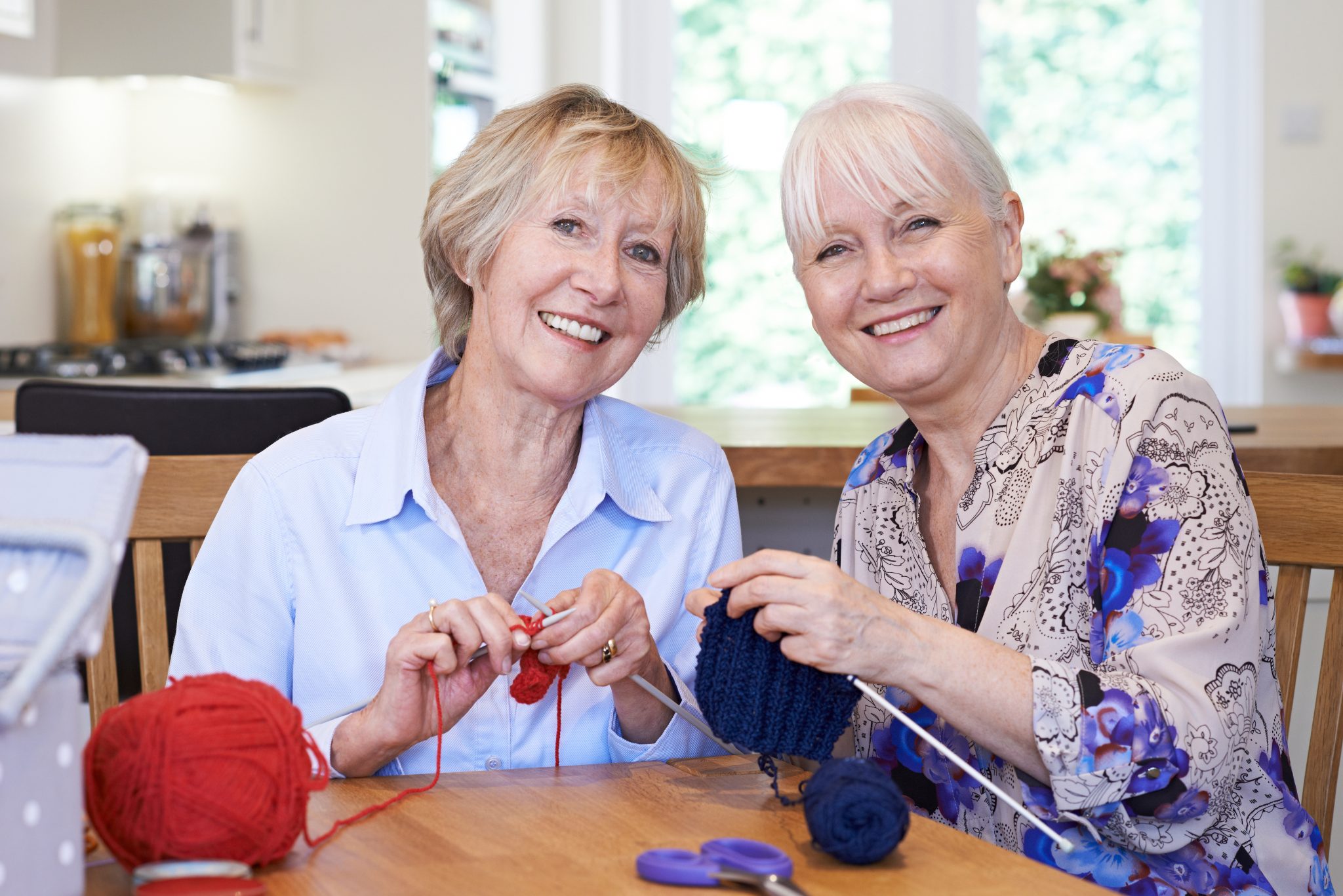Though hobbies are often seen as simple ways to pass time, they can actually have incredible benefits! For older adults, these benefits can be especially impactful—by picking up a hobby or two, you can improve your cognitive clarity, health, and overall quality of life by quite a large margin.
While these benefits vary by hobby and circumstance, there are several positives that most hobbies can offer. Perhaps most notable for older adults are the benefits for your health. As you grow older your health will naturally start to deteriorate, which can result in serious health issues; these in turn can cause a great deal of stress, which can lead to poor mental health and a loss of cognitive clarity. Therefore, it’s important to take care of both your physical body and your mind—and luckily, your hobbies can help. Studies have suggested that participating in hobbies can reduce the risks of developing several diseases, including heart disease, strokes, and certain types of cancer, increasing your longevity and helping to reduce stress. They can also improve your overall quality of life by alleviating symptoms of mental health conditions including depression and anxiety.
On top of this, having certain kinds of hobbies—particularly those which involve active mental and physical engagement—can aid in memory retention, prevent cognitive decline, and even reduce your risks of developing dementia. According to the National Institute on Aging, having variety in your hobbies is crucial for achieving these results, meaning that even if you have a few solid hobbies already, it can be highly beneficial to try out a few more!
Choosing a Hobby
How you go about choosing a hobby is really up to you. For some, you may have an idea of what interests you, or what you might like to explore further. For others, you may have had a hobby for a while but gotten bored of it, or you may simply be looking for something new to spice up your life. Whatever your situation, a good way to start is by examining your current interests and your goals for the future.
Your goals may be oriented around your mind; things like improving your mental clarity, strengthening your memory, and reducing stress levels are all examples of this kind of goal. If this is the case, try to focus on hobbies that engage your creativity and include active learning—in other words, hobbies that involve learning something new. Take some time now to come up with ideas for yourself. What are you interested in, but haven’t gotten around to trying out yet? What new skills would you like to learn? Are there any forms of creative expression that you would like to try?
As mentioned in the beginning of this article, your physical health has a direct impact on your mental health. For this reason, even if your goals are centered around your mind, picking up hobbies that improve and engage your body can directly benefit your cognitive health. Try asking yourself some of the following questions to get yourself thinking about physical hobbies: Do you want to target your strength, endurance, flexibility, or work on all of the above? What physical limitations might you encounter? What physical activities are most interesting to you?
You may also have goals relating to your social life, or perhaps your spirituality or religion—things like wanting to meet new people, or looking for ways to feel closer to your faith. These goals can also help to keep your mind sharp; for example, one NCBI study found that social isolation and loneliness increased one’s risks of developing dementia by up to 60%. Emerging studies have also linked spirituality with improved mental health—in an NPR interview, one psychologist shared that those with meaningful spiritual lives were 80% less likely to develop addictions and depression. Therefore, engaging in hobbies that nurture your social and spiritual health can directly improve your cognitive health. With that in mind, take some time to brainstorm hobbies that impact these areas of your life. What hobbies might get you out of the house more? Are there any hobbies that directly relate to your faith, your friends, or any other personal goals?
If you are able to come up with a list of potential hobbies, that’s excellent news! Now, you can start researching and trying things out to see if any are a good fit for you. If coming up with hobbies is tricky—we’ve definitely put you on the spot here—that’s fine too. The rest of this article will provide you with some suggestions, which you can expand on or modify as needed.
Learn New Skills
Some of the best hobbies for mental clarity are those which involve learning new skills. In fact, staying mentally active through continued learning has been directly linked to higher levels of cognitive clarity, with one particular Mayo Clinic study concluding that “lifetime intellectual enrichment might delay the onset of cognitive impairment (and) reduce the impending dementia epidemic”.
Luckily, there is no shortage of interesting new things to try. If you have been meaning to get better at using technology, you might try playing computer games to improve your keyboard skills, start an online blog, or try out digital forms of preexisting hobbies, like drawing or playing card games. Other ideas for new hobbies include cooking, dance, photography, playing a new instrument; you might also try making new forms of art through sculpture, painting, or gentler art forms such as finger painting, collage-making, scrapbooking, or clay modelling. The possibilities are truly endless! The trick is to find an activity that you are interested in, and that will offer you learning opportunities. Even just going to a museum and listening to a guided tour can get your brain moving!
Practice Mindfulness
Practicing mindfulness can make the process of aging significantly easier—this includes not only your cognitive clarity, but also your overall mental, physical, and spiritual health. One mindfulness activity, meditation, has been linked with decreased stress, relief from symptoms of depression and anxiety, reduced inflammation, diminished chronic pain, a better spiritual life, and much more. Meditation is also great because of just how accessible it is; you don’t need any special equipment, and it can be done from anywhere, at any time. The most common form of meditation involves nothing more than closing your eyes and focusing on your breath! If this piques your interest, don’t hesitate to try it out! Meditation is a highly beneficial hobby to pick up, and there are plenty of guides on how to start.
If meditating isn’t really your thing, there are many other mindfulness activities that can offer similar positives. One such activity is journaling. When you hear the word “journaling”, you likely picture something along the lines of sitting down at the end of the day to reflect on your day, or writing entries in the morning to plan for the day ahead. But, while these are both perfectly valid forms of journaling, it should be noted that they are not the only forms. You might choose to reflect on other things, such as things you are grateful for or worries you may have, or keep a one sentence journal where you write just one thought per day. Just like meditation, journaling can be made your own, making it an accessible and adaptable hobby; you could even pair it with other forms of self-reflection, like habit trackers and to-do lists. If you are interested in starting to keep a journal, you can find templates online, visit your local stationery shops, or even try making your own journal using an old notebook—this can be a particularly rewarding process, as it allows you complete freedom over the layout, style, and content.
Move Your Body

Luckily, there are many different ways to stay active, many of which can be adapted to suit your individual needs. As a general rule of thumb, adults aged 65 and older should be aiming to get 150 minutes of moderate exercise each week, combining both aerobic and muscle-strengthening exercises. For those without major physical limitations, this could look like going to pilates, dance, yoga, or weight-training classes, taking brisk walks, or swimming at a local pool. If you are looking for gentler forms of exercise that place less strain on the body, you could try seated exercise classes, tai chi, aquatic fitness (also known as aquafit), or low-impact yoga. The most important thing with exercise is to find a form that feels good for you—if you love it, you’re much more likely to stick with it.
As a final note, remember to both warm up and cool down before exercising. Doing dynamic stretches (stretches that include movement) before you start exercising, as well as static stretches (where you hold the stretched position) after you finish, can greatly reduce the strain on your body and help to maintain joint and muscle health. This can also help to prevent injuries, which can have significant negative effects on your mental state. Remember—a healthy body means a healthy mind!
Try Gardening
One of the single best hobbies for seniors is gardening. While it may seem like a pretty sedentary activity, gardening can actually help to increase your mobility, dexterity, and endurance; whether you’re picking up a pot, digging soil, or spreading mulch, your body actually does a fair amount of moving. If you garden outdoors in your yard or on your balcony, the exposure to sunlight also gives you vitamin D, an essential nutrient which promotes bone and immune system health. Just don’t forget your sunscreen!
There are plenty of mental benefits to gardening as well. Numerous studies have shown that exposure to greenery—whether that be through photos, views from windows, nature walks, or indoor plants—has a clear positive effect on the mind. In fact, indoor gardening has even been used in the treatment of mental health disorders. Gardening in general has also been reported to “delay the symptoms of dementia”, according to a 2018 NLM article. Watching your plants flourish also brings a strong sense of accomplishment, further improving your mental state.
If the climate you live in is mild, gardening outside is an excellent hobby to try out. If you have access to a yard, balcony, or porch, you can start by growing hardy flowers such as peonies, hardy geraniums, and lavender, or vegetables like kale, beans, and peas. If you have a hard time staying crouched or bent over, investing in raised planter beds can make this hobby more accessible to you.
Even if you don’t have access to an outdoor space, growing houseplants can be an easy way to bring some greenery into your life. Depending on which direction your windows face, you may want to get plants that are okay in low light; generally, succulents such as snake plants and aloe vera will thrive with little fuss.
Get Social
Staying socially active is one of the best things you can do for your mental clarity. In a 2023 article by John Hopkins Medicine, social isolation was highlighted as a key contributor to dementia, with a 27% increase in dementia risk being seen in socially isolated older adults. Because of this, it is crucial to find ways to interact with others on a regular basis. Hobbies are an amazing way to do this, as they create common ground, and therefore a base for connection and friendship to be built on.
One simple way to meet others is by attending events and classes relating to your hobbies. This might look like cooking classes, dance lessons, photography events, choir or music performances, or anything else that sparks your interest. You might also try attending introductory classes for a new hobby that you’ve just started, or even teach a seminar on a preexisting hobby of your own—teens and young adults are often interested in anything “retro”, so your old habits might be a big hit! Passing on the knowledge you have accumulated throughout your life can also help to bring all generations of your family together; you could try to make a habit of hosting a family gathering each month to swap hobby knowledge, stories from your pasts, recipes, and more. You might just inspire someone to pick up a new hobby of their own.
If you want to get involved in your community, you could make a hobby of volunteering with local organizations. You might help out people in need by serving food and organizing clothing drives, or clean up your neighbourhood’s green spaces with a group of your friends. Being generous with your time and effort will not only make a difference in the lives of others, but also in your own; research has revealed that showing generosity has a genuine positive effect on mental health, producing feel-good chemicals like dopamine and serotonin.
Final Remarks







